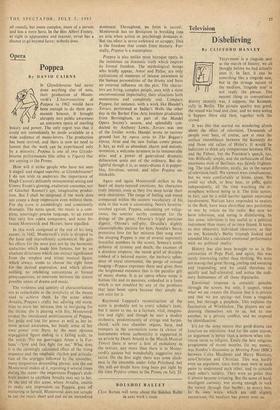Opera
Poppea
By DAVID CAIRNS
How will it strike people who have not seen it staged, and staged, superbly, at Glyndebourne? I do not wish to underrate the importance of Hugh Casson's delicately monumental setting and Conwy Evans's glowing, exuberant costumes, nor of Giinther Rennert's apt, imaginative produc- tion. But I shall be surprised if the work does not create a deep impression even without them. For the score is astoundingly and consistently dramatic. The notes speak, the music is a com- plete, unerringly precise language, to an extent that very few opera composers, and none be- tween Monteverdi and Mozart, have equalled.
In this work composed at the end of his long career, in 1642, Monteverdi's style is sfripped to the bone and Marvellously economical. He gets his effects for the most part not by the harmonic audacities which made him famous, but by an absolute directness which can extract significance from the simplest and tritest musical figure, which always seems to choose the right form for the desired expression, and which allows nothing, no inhibiting conventions or formal preoccupations, to intervene between the closest possible union of drama and music.
The vividness and subtlety of characterisation are as remarkable as the simplicity of the means used to achieve them. In the scene where Arnalta, Poppea's crafty but adoring old nurse, tries to warn her mistress that in intriguing for the throne she is playing with fire, Monteverdi evokes the intoxicated ambitiousness of Poppea, her pride and lust for power as well as her in- tense sexual awareness, her heady sense of her own power over Nero, by the most oinious arpeggiated figure ending in a falling scale, to the words 'Per me guerreggia Amor e la For- tuna'—'love and fate fight for me.' What does it is the cunningly calculated effect of the rising sequence and the emphatic rhythm and articula- tion of the arpeggio followed by the smoother, more languorous descending phrase, and the use Monteverdi makes of it, repeating it several times during the scene—the impervious Poppea's stub- born answer to anything Arnalta may say to her. At the end of this scene, where Arnalta, unable to make any impression on Poppea, goes off muttering to herself, Monteverdi does not scruple to cut the music short and end on' an unresolved dominant. Throughout, no form is sacred: Monteverdi has no hesitation in breaking into an aria when action or psychology demands it. But the effect is never awkward or scrappy. This is the freedom that comes from mastery. For- mally, Poppea is a masterpiece.
Poppea is also unlike most baroque opera in the insistence on dramatic truth which inspires its formal freedom. The mythological beings who briefly appear, Amor and Pallas, are only stylisations of moments of intense awareness in the human personalities of the drama and have no external influence on the plot. The charac- ters are living, complex people, seen with a most unconventional impartiality, their situations both momentous and completely, real. Compare Poppea, for instance, with a work like Handel's Xerxes, performed at Sadler's Wells the other day in the Barber Fine Arts Institute production from Birmingham, as part of the Handel Opera Society's season, and splendidly con- ducted by Anthony Lewis. Xerxes was one of the livelier works Handel wrote to recover ground lost by opera seria to The Beggar's Opera, Arne and the new Italian comic pieces. It has, as well as abundant charm and melodic invention, a welcome terseness in its innumerable arias and a power of generalised dramatic delineation quite out of the ordinary. But de- lightful though it is, as music-drama it is puppet- like, frivolous, unreal, and after Poppea un- thinkable.
Again and again Monteverdi strikes to the heart of many-layered emotions; his characters truly interact, even as they live deep inside their own obsessions. The range of feeling and mood compassed within the austere vocabulary of his style in this work is astonishing. Nero's hysteria- touched egoism, Poppea, calculating yet volup- tuous, the sentries' earthy contempt for the doings of the great, Ottavia's frigid patrician dignity, Ottone's self-pity, Drusilla's slightly claustrophobic passion for him, Arnalta's fierce, protective love for her mistress (her song over the sleeping Poppea is one of several supremely beautiful numbers in the score), Seneca's noble defiance of tyranny and death; the excesses of a drunken emperor, the numb grief of disciples robbed of a beloved master, the barbaric splen- dour of royal ceremonial, the pangs of sensual longing—Poppea expresses them and gives them the heightened existence that is the peculiar gift of music drama. It is an opera whose scope is human life and its passions, embodied in a form which is not troubled by any of the problems that later beset opera because they simply do not exist for it.
Raymond Leppard's reconstruction of the score is probably not to every scholar's taste, but it seems to me, as a layman, vital, imagina- tive and right; and though he uses a modest orchestra, predominantly of strings and harpsi- chord, with two chamber organs, harp, and trumpets in the coronation scene (a choice of instruments whose authenticity is supported in an article by Denis Arnold in the March Musical Times) there is never a hint of monotony in the texture, any more than there is in Monte- verdi's austere but wonderfully suggestive reci- tative. On the first night there was some slack- ness in the ensemble under John Pritchard, but this will no doubt have long been put right by the time Poppea comes to the Proms on July 29.






































 Previous page
Previous page